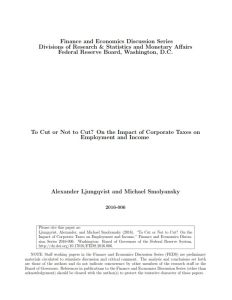Join getAbstract to access the summary!

Join getAbstract to access the summary!
Alexander Ljungqvist and Michael Smolyansky
To Cut or Not to Cut?
On the Impact of Corporate Taxes on Employment and Income
Federal Reserve Board, 2016
What's inside?
Corporate tax cuts may not always deliver the economic benefits that politicians and CEOs expect.
Recommendation
Cut corporate tax rates, many pundits proclaim, and watch employment increase, personal incomes surge and economic growth accelerate. Not so fast, according to economists Alexander Ljungqvist and Michael Smolyansky, who analyzed data from US counties that share a state border. Their research reveals that a correlation does exist between lower corporate rates and stronger economic activity, job creation and higher incomes during recessionary periods, but not when economies are growing. As states compete with each other to persuade companies to stay or relocate, getAbstract urges executives and policy makers to explore this compelling report.
Summary
About the Authors
Alexander Ljungqvist is a professor at the Stern School of Business at New York University. Michael Smolyansky is an economist with the Federal Reserve Board of Governors.



















Comment on this summary